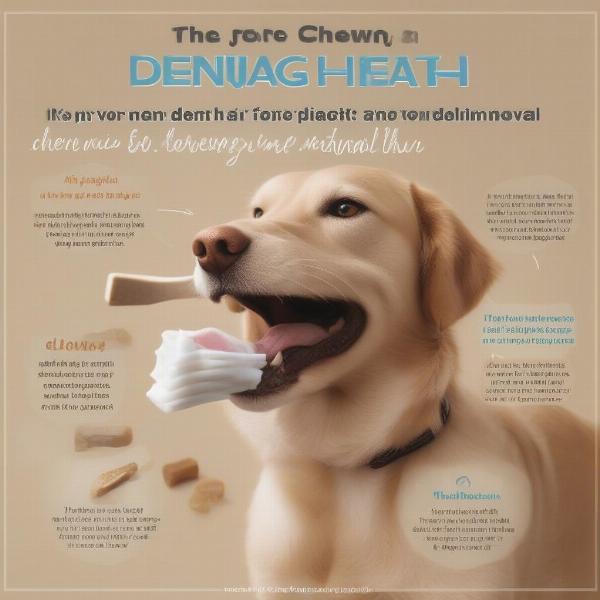Choosing the right chew for your dog can be a daunting task, especially with the overwhelming variety available on the market. Healthy dog chews, however, are more than just a way to keep your furry friend occupied; they offer a range of benefits, from promoting dental health to relieving anxiety. This guide will help you navigate the world of dog chews, ensuring you select a safe, healthy, and enjoyable option for your canine companion.
Understanding the Benefits of Healthy Dog Chews
Chewing is a natural instinct for dogs, crucial for their physical and mental well-being. Providing healthy dog chews caters to this innate need, offering numerous advantages:
- Dental Health: Chewing helps scrape away plaque and tartar buildup, promoting healthy gums and preventing bad breath.
- Stress Relief: Chewing can have a calming effect on dogs, helping to reduce anxiety and boredom, especially in puppies or dogs left alone for extended periods.
- Jaw Strength and Muscle Development: The act of chewing strengthens jaw muscles and improves overall oral health.
- Entertainment and Mental Stimulation: Chews provide a healthy outlet for a dog’s natural chewing instincts, preventing destructive behavior directed at furniture or personal belongings.
 Healthy Dog Chews for Dental Benefits
Healthy Dog Chews for Dental Benefits
Choosing the Right Chew for Your Dog
Selecting the appropriate chew depends on several factors, including your dog’s age, size, breed, and chewing habits.
Chew Selection Based on Age
- Puppies: Opt for softer chews designed for teething puppies to soothe sore gums. Avoid hard chews that could damage developing teeth.
- Adult Dogs: A wider range of chews is suitable for adult dogs, from durable nylon bones to natural antlers. Consider your dog’s chewing strength and choose a chew that can withstand their powerful jaws.
- Senior Dogs: Older dogs may have weaker teeth and jaws. Softer chews or those designed for dental health are ideal.
Material Matters: Types of Healthy Dog Chews
- Natural Chews: Antlers, bully sticks, and dried tendons are examples of natural chews that are long-lasting and digestible.
- Nylon Chews: These durable chews are designed for aggressive chewers and are available in various shapes and sizes.
- Dental Chews: Specifically designed to promote dental health, these chews often have textures and ingredients that help clean teeth.
- Treat-Dispensing Chews: These interactive chews keep dogs entertained by dispensing treats as they chew, promoting mental stimulation.
Ensuring Safety with Dog Chews
While dog chews offer many benefits, safety should always be a priority.
- Size Matters: Choose a chew that is appropriately sized for your dog to prevent choking hazards. Avoid chews that are too small or can be easily swallowed whole.
- Supervision is Key: Always supervise your dog while they are chewing, especially with new chews.
- Inspect Regularly: Check the chew for signs of wear and tear and replace it when it becomes too small or damaged.
- Avoid Rawhide: Rawhide can be difficult to digest and pose a choking risk. Opt for safer alternatives.
What to Look for in Healthy Dog Chews
Choosing healthy dog chews involves looking beyond just the material. Consider the following:
- Ingredients: Opt for chews made with natural, high-quality ingredients and avoid those with artificial colors, flavors, or preservatives.
- Digestibility: Choose easily digestible chews to prevent stomach upset.
- Durability: Select a chew that can withstand your dog’s chewing habits.
- Dental Benefits: If dental health is a concern, choose chews specifically designed to clean teeth and gums.
Conclusion
Healthy dog chews are a valuable addition to any dog’s routine. By understanding your dog’s needs and choosing appropriate and safe chews, you can provide them with a source of enjoyment, mental stimulation, and dental health benefits. Remember to always supervise your dog while chewing and replace worn-out chews to ensure their safety and well-being.
FAQ
- Are all dog chews safe? No, not all dog chews are created equal. Some can be choking hazards or contain harmful ingredients. Choose carefully based on your dog’s size, age, and chewing habits.
- What are some good alternatives to rawhide? Bully sticks, antlers, and dental chews are all safer alternatives to rawhide.
- How often should I give my dog a chew? This depends on your dog’s individual needs and the type of chew. Some chews are meant for daily use, while others are longer-lasting and can be given less frequently.
- Can puppies have any type of chew? No, puppies should have chews specifically designed for their teething needs. Avoid hard chews that could damage their developing teeth.
- What should I do if my dog swallows a large piece of a chew? Contact your veterinarian immediately if your dog swallows a large piece of a chew.
- How do I know if a chew is too small for my dog? If your dog can swallow the chew whole or break off large pieces easily, it’s too small.
- Are there any dog chews that help with anxiety? Yes, chewing can be a calming activity for dogs. Look for durable chews that can withstand prolonged chewing.
Suggested Further Reading
ILM Dog is your trusted resource for expert dog care advice. We cover a range of topics from breed selection and health to training and nutrition. Whether you’re a new dog owner or a seasoned pro, ILM Dog provides practical guidance and valuable insights to help you nurture your canine companion’s well-being. For any inquiries, contact us at [email protected] or +44 20-3965-8624. Visit ILM Dog for more helpful resources and expert advice.